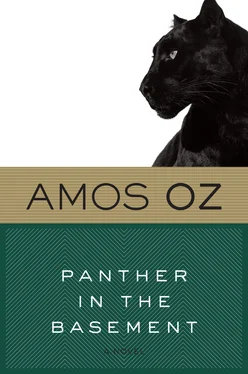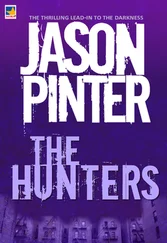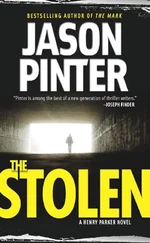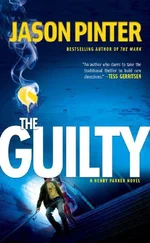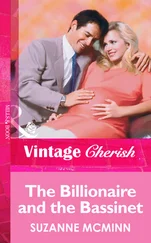In the meantime, until the British pulled out and the Hebrew State finally emerged, the grocer's and the greengrocer's opened at seven in the morning and closed at six in the evening in time for the curfew. The neighbors — the Dorzions, Dr. Gryphius, ourselves, Ben Hur and his parents — gathered at Dr. Buster's because he had a radio. We listened in gloomy silence to the news on the Voice of Jerusalem. Sometimes, after dark, very softly, we listened to the clandestine broadcast of the Voice of Fighting Zion. Sometimes we stayed on after the news to listen to the appeals for missing relatives, in case they suddenly mentioned a relative murdered in Europe who turned out to have survived after all and had managed to make his way to the Land of Israel or at least to one of the DP camps that the British had set up in Cyprus.
There was silence in the room during the broadcast, like a curtain stirring in the breeze in the dark. But as soon as the radio was turned off, everyone started talking. They talked incessantly. What had happened, what was going to happen, what might or could or should be done, what chances we had left: they talked as though they were afraid that something terrible would happen if a moment's silence should suddenly fall. If ever that cold grey silence peered over the shoulder of the discussion and arguments, they silenced it immediately.
Everybody read the papers, and when they finished reading them they swapped with each other: Davar, Hamashkif, Hatsofeh, and Haarets passed from hand to hand. And because the days were much longer then than they are nowadays, and each paper had only four pages, in the evening they reread what they had already scoured in the morning. They stood in a little group on the sidewalk in front of the Sinopsky Brothers grocery and compared what was written in Davar about our moral strength with what Haarets said concerning the importance of patience: was there possibly something crucial lurking between the lines that had been missed on the first and second readings?
Besides Mr. Lazarus, there were other refugees in the neighborhood, from Poland, Romania, Germany, Hungary, Russia. Most of the residents were not called "refugees," nor were they termed "pioneers" or "citizens": they were described as "the organized community," which was located more or less in the middle, beneath the pioneers and above the refugees, in opposition to the British and the Arabs but also opposed to the militants. But how could you tell the difference? Almost all of them, pioneers and refugees and militants, spoke with throaty rs and liquid Is, except for the orientals, who spoke with trilled rs and harsh guttural sounds. The parents hoped that we children would grow up to be a new kind of Jew, improved, broad-shouldered, fighters and tillers of the soil, which was why they stuffed us full of liver, chicken, and fruit, so that when the time came we would stand up, bold and suntanned, and not let the enemy lead us like sheep to the slaughter again. Sometimes they would feel nostalgic for the places they had come here from: they would sing songs in languages we didn't know, and they would give us rough translations, so that we, too, would know that once upon a time there had been rivers and meadows, forests and fields, thatched roofs and bells ringing in the mist. Because here in Jerusalem the waste plots stood parched in the summer sun and the buildings were made of stone and corrugated iron, and the sun scorched everything as though the war was here already. The dazzling light preyed on itself from morn to evening.
Occasionally someone would say: "What's going to happen?" and somebody else would answer: "We must hope for the best," or "We've just got to carry on." My mother would sometimes sit bent over a box of photos and mementos for five or ten minutes, and I knew that I had to pretend not to see. Her parents and her sister Tanya had been murdered by Hitler in the Ukraine, along with all the Jews who had not managed to get here in time. Father once said:
"It's incomprehensible. Simply unbelievable. And the whole world said nothing."
He, too, grieved sometimes for his parents and his sisters, but not with tears: he would stand for half an hour or so, in the rather sour, angular pose of a man who is stubbornly in the right, and peer closely at the maps that were pinned up on the wall in the hallway. Like a general in his HQ: staring and saying nothing. His view was that we must drive out the British occupier and set up a Hebrew State here that all persecuted Jews all over the world could come to. He said, "It must evidently set a model of justice to the world, even toward the Arabs if they choose to stay and live here among us. Yes, despite everything the Arabs are doing to us, because of the people who are inciting them and egging them on, we will treat them with exemplary generosity, but definitely not out of weakness. When the free Hebrew State is finally established, no villain in the world will ever again dare to murder or humiliate Jews. If he does, we will smite him, because when the time comes we will have a very long arm indeed."
When I was in the fourth or fifth grade at school I carefully traced the map of the world from Father's atlas in pencil on tracing paper, and I marked the promised Hebrew State: a green patch between the desert and the sea. From this green patch I drew a long arm across continents and seas, and at the end of the arm I put a fist that could reach everywhere. Even to Alaska. Beyond New Zealand.
"But what have we done," I once asked over supper, "to make everyone hate us so?"
My mother said:
"It's because we have always been in the right. They can't forgive us that we've never hurt a fly."
I thought, though I didn't say it: It follows that it is definitely not worth being in the right.
And also: It explains Ben Hur's attitude. I am in the right, and I don't hurt a fly either. But from now on a new age will start: the age of the panther.
Father said:
"It is a sad and obscure question. In Poland, for example, they hated us because we were different, because we were strange, because we talked and dressed and ate differently from those around us. But a few miles away, across the border in Germany, they hated us for the opposite reason: in Germany we talked and ate and dressed and behaved exactly like everybody else. So the anti-Semites said: 'Look at them insinuating themselves, yes indeed, you can no longer tell who is a Jew and who isn't.' That is our fate: the excuses for hatred change but the hatred itself continues forever. And what is the conclusion?"
"That we should try not to hate," said my mother.
But Father, whose blue eyes blinked rapidly behind his glasses, said: "We must not be weak. To be weak is a sin."
"But what have we done?" I asked. "How have we made them so angry?"
"That question," Father said, "you should put to our persecutors, not to us. And now would Your Highness please pick up your sandals from under the chair and put them where they belong. No, not there. Not there either. Where they belong."
At night we could hear shots and explosions in the distance: the Underground was coming out of its secret bases and attacking the centers of the British government. By seven o'clock we would have closed the doors and shutters and shut ourselves in till the morning. There was a night curfew in the city. A clear breeze blew in the abandoned streets, along in the alleys and up the winding stone steps. Sometimes we would jump at the sound of a trash-can lid knocked off by an alley cat in the dark. Jerusalem stood still and waited. Inside our apartment there was silence most of the evening. Father sat with his back to us, separated from us in the ring of light cast by his desk lamp, dug in among his books and index cards, his fountain pen scratching at the silence, stopping, hesitating, then scratching again, as though it was digging a tunnel. Father was checking, comparing, perhaps pinning down a stray detail in the notes he was gathering for his great book on the history of the Jews in Poland. My mother would sit on the other side of the room, in her rocking chair, reading or, with her open book face down on her lap, listening attentively to some sound I could not hear. At her feet on the rug I would finish reading the paper and start to sketch out the battle plan for the lightning raid by the Underground on the key government points in Jerusalem. Even in my dreams I defeated enemies, and I continued dreaming of wars for several years after that summer.
Читать дальше
